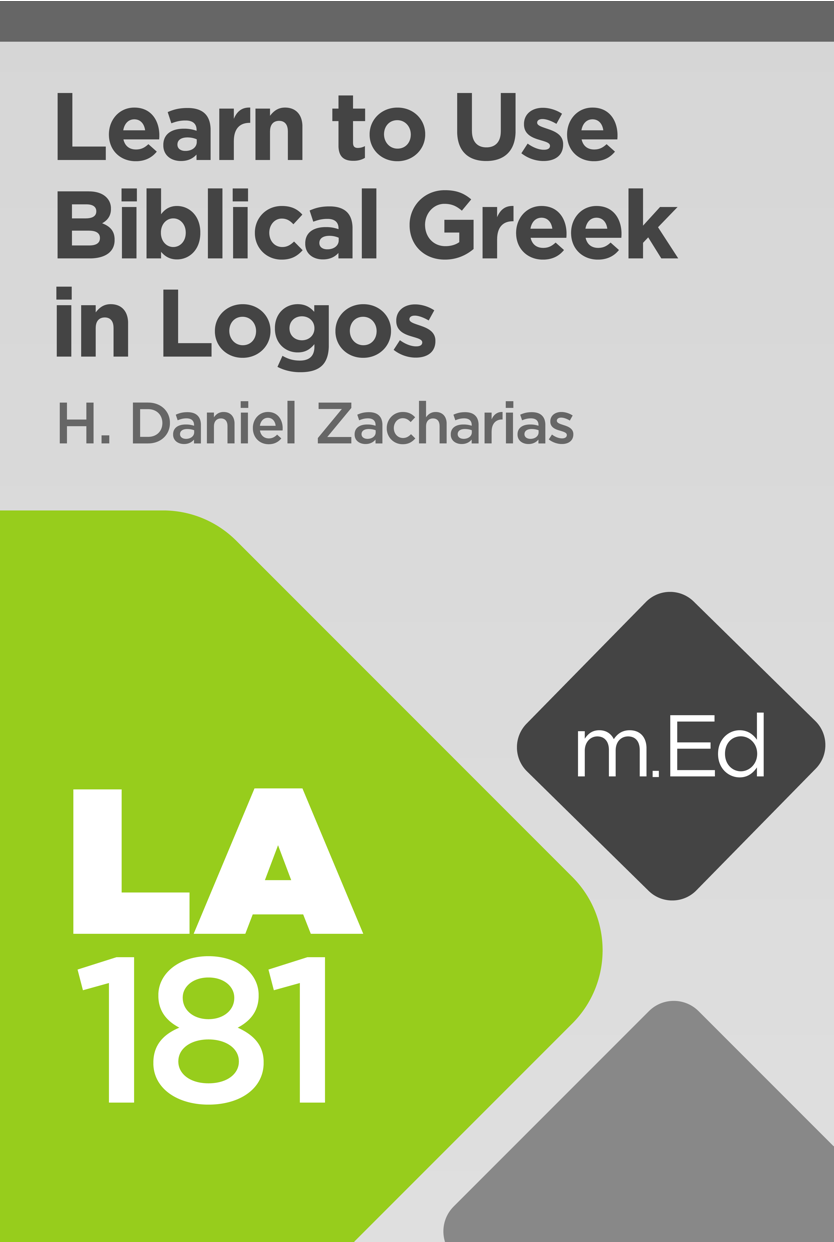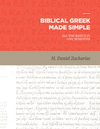Mobile Ed: LA181 Learn to Use Biblical Greek in Logos (10 hour course)
Digital Logos Edition
Overview
Learn to Use Biblical Greek makes extensive use of Logos tools and resources to teach beginning Greek grammar. Get an in-depth look at reverse interlinears, and understand important Greek lexicons and theological dictionaries and how to best use these resources in Logos. Learn how to do Greek word studies using the Word Study Workflow feature in Logos. Dr. Zacharias introduces you to Greek grammar—nouns, indicative verbs, non-indicative verbs, participles and infinitives, and other parts of speech like prepositions, adjectives, and pronouns.
This title is included in the following collections
You can save when you purchase this product as part of a collection.
Mobile Ed: Learn to Use Biblic...
$659.99$659.99

Upon successful completion you should be able to:
- Title: LA181 Learn to Use Biblical Greek in Logos
- Instructor: H. Daniel Zacharias
- Publisher: Lexham Press
- Publication Date: 2020
- Product Type: Logos Mobile Education
- Resource Type: Courseware, including transcripts and video resources
- Video Hours: 10

LA181 Learn to Use Biblical Greek in Logos
- Instructor: H. Daniel Zacharias
- Video hours: 10
Contents:
Introduction
- Introducing the Speaker and Course
Unit 1: Reverse Interlinears
- What Is a Reverse Interlinear?
- Reverse Interlinear English Bible Translations
- Information Included in an Interlinear
- Finding How Many Times a Greek Word Occurs
- Finding Where a Greek Word Is Used
- Septuagint Resources
Unit 2: Word Study Resources
- Introduction: Lexicons and Theological Dictionaries
- Strong’s Dictionary
- Louw-Nida
- Louw-Nida in Reverse Interlinears
- DBL Greek
- Lexham Analytical Lexicon to the Greek New Testament
- BDAG
- Bible Sense Lexicon
- LSJ
- Septuagint Lexicons
- Moulton and Milligan
- TDNT
- NIDNTTE
- EDNT and TLNT
- Lexham Theological Wordbook
Unit 3: Word Studies
- Introduction to Word Studies
- Word Study Workflow
- A Word on Method
- “Sign” in John (Part 1)
- “Sign” in John (Part 2)
- “Sign” in John (Part 3)
- Synthesizing Observations on “Sign”
- “Sign” in the New Testament
- Research Lexicon Entries
- Senses of the Word
- Lemma Discussion in Commentaries
- Outside the Bible and Summative Observations
- Etymological Fallacy
- Semantic Anachronism
- Illegitimate Totality Transfer
- One-Meaning Fallacy
- Separating Meaning from Culture
Unit 4: Grammar: Nouns
- Introducing Grammar
- Overview of English Grammar, Parts of Speech
- Setting up Visual Filters
- Introducing Greek Nouns
- The Nominative Case
- The Genitive Case
- The Dative Case
- The Accusative Case
- The Vocative Case
- Final Word on Noun Cases
Unit 5: Grammar: Indicative Verbs
- Introducing Indicative Verbs
- Voice of Verbs
- Person and Number of Verbs
- Aorist Tense Verbs
- Present Tense Verbs
- Imperfect Tense Verbs
- Future Tense Verbs
- Perfect and Pluperfect Tense Verbs
Unit 6: Grammar: Other Parts of Speech
- Conjunctions
- Prepositions
- The Definite Article
- Adjectives
- Personal Pronouns
- Adjectival Pronouns
- Pronouns That Ask Questions and Introduce Clauses
Unit 7: Grammar: Non-Indicative Verbs and Verbals
- The Imperative
- The Subjunctive
- Conditional Sentences
- The Participle
- Adverbial Participles
- The Infinitive
- Adverbial Infinitives
Conclusion
- Moving Forward in Greek
- Alphabet Interactive
- Audio Greek New Testament
- Biblical Greek Made Simple
- Discourse Greek New Testament
- Greater Understanding of Scripture
H. Daniel Zacharias (PhD, University of Aberdeen / Highland Theological College) is Assistant Professor of New Testament at Acadia Divinity College. He resides in Wolfville, Nova Scotia with his wife Maria and their four children.

Biblical Greek Made Simple: All the Basics in One Semester
- Author: H. Daniel Zacharias
- Publisher: Lexham Press
- Publication Date: 2018
- Pages: 360
- Format: Logos Digital
Diligent study of God’s Word involves engaging with it in the language it was written.
Learning Greek can be a challenging experience for seminary students but it is a critical piece of their education. Engaging with the Bible in its original language will lead to deeper understanding, new insights, and provide tools to enter into the conversation surrounding God’s Word.
Biblical Greek Made Simple is a one-semester textbook that teaches the basics of biblical Greek. Designed with the modern student and curriculum in mind, this grammar introduces all the essential elements of biblical Greek while also utilizing the tools and features of Logos Bible Software to help retain and enhance knowledge of Greek. Each chapter includes exercises tailored to its contents as well as additional teaching material for further advancement. Daniel Zacharias provides a solid overview of the entire biblical Greek system, while challenging students to understand how this ancient language is relevant to meaning and translation.
Danny Zacharias is a master teacher of elementary Greek. I'm delighted to see in this new book, Biblical Greek Made Simple, a coalescence of Dr. Zacharias's scholarly knowledge, pedagogical skill, and technological competence. As many colleges and seminaries already employ Logos Bible Software in the teaching of Greek, this textbook, which integrates learning to use the Logos software alongside a more traditional teaching approach, will prove invaluable.
—Robert L. Plummer, professor of New Testament interpretation, The Southern Baptist Theological Seminary
Why not try teaching or learning Greek as though Bible software was our friend? This is exactly what Danny Zacharias does in this highly innovative approach to acquiring competency in the language of the New Testament and Septuagint. His visual approach to the formation of Greek words is splendid and discussions of grammar and syntax focus well on those facets that are most important for interpretation. I am deeply impressed both by the detailed lesson plans in every chapter that allow for closely guided self-study and the links to professional-quality instructional videos on every aspect of Greek and the use of Logos that make of this book a virtual course in the language in and of itself. Seminary professors and motivated individual learners alike will want to give this a close look.
—David A. deSilva, Trustees' Distinguished Professor of New Testament and Greek, Ashland Theological Seminary
This is a well-organized, thoughtful, and up-to-date approach to learning foundational elements of New Testament Greek. It is an interactive guide, not a dull-and-distant textbook. It makes strategic use of Logos Bible Software to enhance the learning process. I welcome its addition to the very short list of good first-semester guides to beginning the life-long process of learning to read the New Testament in its original language.
—Robert W. Yarbrough, professor of New Testament, Covenant Theological Seminary
H. Daniel Zacharias (PhD, University of Aberdeen / Highland Theological College) is Assistant Professor of New Testament at Acadia Divinity College. He resides in Wolfville, Nova Scotia with his wife Maria and their four children.
Reviews
4 ratings
Bryan Geary
5/2/2023
This course is primarily about how to do real Greek study using the tools available in Logos (somewhat) and not a course designed to teach you Biblical Greek. H. Daniel Zacharias clearly knows his stuff and walks you through many examples and illustrations of why and how you use particular works and some of the common problems to avoid for those of us who do not have a seminary degree or formal education in Greek. But it assumes a pretty broad library (I've definitely added a bunch of other resources to my library from what I learned) and the biggest issue for me was this appears to have been developed with Logos version 7 or 8. So the ways he shows you to use something do not always work and then you need to spend some time in the help or forums to figure out the way to do it in the current version when it is not readily apparent. Overall it is a really good resource. It recommends the Academic Platinum edition but I really just wish it would list the particular resources needed (like the BDAG lexicon, the TDNT dictionary and the NIDNTTE dictionary as examples) and I wish it was more up to date or at the very least had a "Using these features In Logos 10" that showed how to do some of these tasks (like bringing up the grid view for multiple versions of the Bible) in the recent version.
Rev Jerald
12/2/2022
This course teaches us biblical Greek language tools, not biblical Greek. A more appropriate name for this course would be Biblical Greek Language Tools. I wanted to learn biblical Greek. I wasted my money. This course will help us perform word studies.
Matt DeVore
7/17/2022

Benjamin Allen
10/19/2021
The best part of this course is that it teaches you how to use logos for Greek study, it really should be marketed for that. It also highlights the best resources to get when study. Thank you for making something like this for the self taught